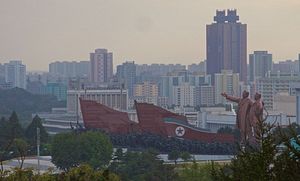Could North Korea be the next Vietnam? Despite this week’s historic peace talks in Singapore, analysts say the “hermit kingdom” has plenty of obstacles to following the lead of its Asian communist-ruled rival.
Speculation over the future of North Korea has intensified following the recent apparent rapprochement by Kim Jong-un. According to reports, the North Korean dictator told his southern counterpart, South Korean President Moon Jae-in, that he preferred Vietnam’s model over China’s “because Vietnam has maintained a great relationship with the U.S.”
The Diplomat has previously noted the strained relationship between Pyongyang and Beijing and how Kim might seek to balance China’s influence with Washington’s economic and military strength.
Comparing North Korea with Vietnam, Bloomberg contributor Shuli Ren sees plenty of possibilities should the long-reclusive East Asian nation finally open up.
According to Ren, “North Korea today looks remarkably similar to the Southeast Asian nation in 1986, when its communist neighbor undertook ‘Doi Moi’ reforms to tiptoe toward capitalism. North Korea may have a head start, because it’s richer and more industrialized.”
In 2016, North Korea had an estimated $31 billion in gross domestic product (GDP) compared to Vietnam’s $26 billion as of 1986. Agriculture accounted for nearly 40 percent of Vietnam’s economy in 1986, compared to around 20 percent for North Korea. The reverse was true for industrials, with the two nations similar in services’ share of their economies, according to Morgan Stanley.
Since its reforms however, Vietnam has enjoyed average annual GDP growth of 7 percent compared with just 4 percent in the preceding decade, becoming a manufacturing hub with an economy now six times the size of North Korea.
In 2017, Vietnam enjoyed GDP growth of 6.8 percent, its fastest pace in a decade, helped by foreign investors — including, ironically, South Korean conglomerates such as Samsung.
In contrast, North Korea’s economy has grown by an average of less than 1 percent a year over the past decade, according to estimates by South Korea’s central bank.
However, with labor costs a fraction of those in South Korea, the North could expect to attract investment from its neighbor.
Morgan Stanley points out that investment accounts for around a quarter of Vietnam’s GDP but virtually zero in North Korea. Increasing such flows to 20 percent of GDP could see the North’s economy expand by around 5 percent, the U.S. investment bank estimates.
Yet Vietnam enjoys better demographics, with around 70 percent of its population of working age compared to 44 percent in North Korea. The latter’s working age population is seen peaking by 2020, compared to 2040 for Vietnam.
As previously noted by this column, further peace moves on the Korean Peninsula could help to reduce the “Kospi discount” imposed on South Korean stocks due to concerns over corporate governance and the threat from the North. A “peace dividend” could benefit South Korea’s construction, machinery and steel sectors, while reunification would improve the South’s poor demographic outlook and reduce overall defense costs.
‘Slim Chance’
Nevertheless, not all analysts view the situation with rose-colored glasses.
“While North Korea’s natural resources, geographical location and low labor costs mean its economy has plenty of potential, Kim Jong-un’s hopes of North Korea emulating the economic achievements of Vietnam are slim,” Capital Economics economists Gareth Leather and Krystal Tan said in a June 11 report.
The economists noted North Korea’s advantages, including largely untapped natural resources such as copper, iron, zinc, and rare earths, while it also shares a neighborhood with Asia’s biggest economies, China and Japan.
A South Korean research institute estimated the North’s mineral wealth as worth as much as $10 trillion, some 20 times larger than the South’s.
However, “any opening up is likely to be very slow and gradual,” according to Leather and Tan, who suggest that any lifting of economic sanctions would be done “only incrementally to match the pace of the dismantlement” of its nuclear weapons.
“And even if Kim is committed to denuclearization, there are big doubts about his willingness to open up his country to outside investment. One reason that he sees Vietnam (and China) as a model is that their ruling parties have achieved economic development while maintaining a firm grip on power,” the analysts said.
“But there are examples of other countries in Asia, most notably [South] Korea and Taiwan, where development and the opening of the economy to the outside world have played an important role behind the emergence of democratic movements.”
The London-based consultancy also suggests that foreign investors would be “very cautious” toward any such opening by the North, given previous experience.
This includes the South Korean companies that invested in the Mount Kumgang tourist region and the Kaesong industrial complex, which saw their assets frozen after relations soured. Chinese mining company Xiyang also saw its joint venture to build a mine terminated less than a year after production started, moves by the Pyongyang regime that “certainly won’t inspire much confidence.”
“The problems foreign companies are experiencing in Myanmar, another country that has recently come in from the cold, also serve as a cautionary tale,” they concluded.
NK News’ editor Oliver Hotham cites issues of political and information control as major barriers to any sudden flourishing of the North’s economy.
“Reform and opening up could be highly damaging to political stability. International investors will be extremely skeptical of Pyongyang, while the country’s solipsistic attitude to the world will make it very difficult [to] create trust and mutually beneficial investment schemes. Hence, South Korean government-backed ‘cooperation’ is likely to form the bulk of any future investment ‘boom,’ ” he said.

































